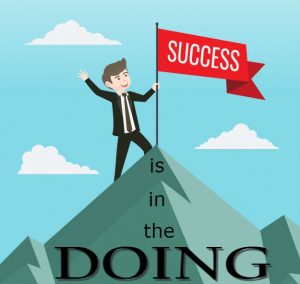
by andrew | May 28, 2018 | Best Practice, Goal Setting, Mindset For Success, Priorities and My Time, Success, Sucess Goals
Stephen Covey’s book proves it and Googles research reinforces it… there is ONE thing in common to every individual, relationship, family, organization, and government throughout the world. The one thing which when removed will destroy the most powerful army, the most successful business, the greatest friendship and the deepest love.

The ONE thing is: TRUST!
- TRUST is the most significant predictor of an individuals’ satisfaction within their team.
- TRUST, not a brand is the number #1 factor consumers use in selecting an agent according to Google research.
So, what is trust? Jack Welch, legendary CEO of General Electric said about trust, “You know it when you feel it!” The truth is, in any relationship, what you do has a far greater impact than what you say. Thus, trust is established through ACTION and action is driven by your behaviors.
In his book The Speed of Trust, Stephen Covey outlines 13 behaviors that drive trust. The first five behaviors relate to character and the second five behaviors relate to competence and the remainder are a mix of the two.
The 13 behaviors are:
- Talk straight
- Demonstrate respect
- Create transparency
- Right wrongs
- Show loyalty
- Deliver RESULTS
- Get better every day (continuous improvement)
- Confront reality
- Clarify expectations
- Practice Accountability
- Listen first
- Keep commitments
- Trust others… extend trust to others as part of your DNA
Covey believes the quickest way to decrease trust is to violate a behavior of character while the fastest way to build trust is to demonstrate a behavior of competence.
In the end, in today’s modern fast-paced economy trust is essential to our mutual prosperity. We can create it, we can restore it and we can extend it.
Trusting this post will prompt you toward a more powerful week. How will you practice trust this week?

by andrew | May 23, 2018 | Appointment Setting, Best Practice, Goal Setting, In The News, JPAR, Mindset For Success, Real Estate, Success, Success From Scratch, Sucess Goals, Top Producer
This week’s episode of “Success From Scratch” features Naddia Morales. Learn how she managed to transition from working for corporate America to being successful in real estate.
Naddia had $212 in her bank account when she started, in this episode learn how she became resourceful despite having no budget and no leads.
“You need to have a process and a system in place in order to grow your business.”
Naddia Morales, JP and Associates REALTORS®

by andrew | May 21, 2018 | Appointment Setting, Best Practice, Goal Setting, JPAR, Mindset For Success, Success, Top Producer

Think about this…success isn’t in the having – SUCCESS IS IN THE DOING.
It’s the process of doing that brings value. It’s the activity that transforms our dreams into reality. For without activity, we will miss the opportunity.
For me and I’d suggest for you, there is a difference between being interested and being fully committed.
When you’re interested in doing something, you do it when it’s easy. You do it when circumstance permits. When the stars align. When you ‘feel like it’. Let’s face it when you are just interested you compromise your goals because you choose to stay aligned with your ‘non-committed’ behaviors.
When you’re committed to something, you accept no excuses, only RESULTS. You just do it, period. Do it even on the days you don’t ‘feel like it’. Never compromise. Never give up. When you are fully committed you become resourceful and align your behaviors consistent with your goals.
So for your 2018 goals are you just interested or fully committed? If your behavior is aligned with your goals, great! If not and you are off track, alter your course right now. Today. Start by doing a little more each day – and pretty soon, you’ll develop a new habit of DOING rather than neglecting.
So what are you committed to?

by andrew | May 7, 2018 | Best Practice, Goal Setting, Mindset For Success, Productivity, Staying Relevant
Staying relevant in today’s fast-changing world is top of mind to many of my friends and business associates.
A University of California, Berkeley study clearly shows the fastest growing “thing” on this planet is the amount of information we are generating. In fact, information is expanding faster than anything else we create or can measure over the scale of decades.
With the rapid increase in information and the changing popularity of online, radio and TV news how do you and your business stay relevant?
You might expect me to say, Facebook, Twitter, LinkedIn or YouTube. While these tools have a role in relevancy, they are simply tactics of a much larger strategy.
To stay relevant today you need to have a “Flexibility and Fast Learning” strategy in place.

Flexibility
Mark Morford, an SF Gate columnist states, “I have found flexibility to be the most frequent reply I give to those who ask me about how the hell they’re supposed to keep up with the onslaught of tech stuff coming at them.”
Flexibility, just means you allow the possibility that some of these seemingly inane developments might be beneficial and you should not dismiss them out of hand because, well, that’s where the action is.
It is common to hear people say that the present is unlike the past. And that is true. For change is indeed constant. If we do not change, we risk being outcast by the wave of societal changes. There are specific common steps among companies and people that have used “flexibility” to reinvent themselves. They are:
1. Having a keen awareness of what is changing and has changed around you. (Be aware)
2. Reflecting on what needs to change within you and your company. (Be Flexible)
3. Checking to make sure those changes match your values and goals. If yes, move to step 4.
4. Fine-tune the plan you need to make that change.
5. Act on your plan to change.
6. Review the change after some time to ensure you are on course.
7. Go back to Step 1 on a regular basis.
Learning Fast
According to KM World, learning before, during and after everything you do is a must in staying relevant. The results of methods such as peer assists (learning before doing), action reviews (learning while doing), and after action reviews (learning after doing) are well-known. If you are not applying those techniques in your business, projects, and teams, you are not staying relevant. Start now.
Here is a checklist of simple questions to guide you through fast learning strategy:
To “learn before doing” at the start of your day or any activity:
- What is supposed to happen today?
- How will I know if I’m successful?
- What knowledge do I need to get what I want to be done, and where can I get it?
- What help do I need?
To “learn while doing” in the middle of a task or activity:
- What was supposed to happen up until now?
- What has actually happened?
- Why are 1 and 2 different?
- What can I learn and do about it right now?
To “learn after doing” at the end of the day or a task:
- What stands out for me that is new or different?
- What should I repeat next time I do this, and why?
- What should I do differently next time, and why?
- Who else may be facing similar challenges and might find this useful?
To remain relevant, you need to have a “flexibility and fast learning” strategy in place. Facebook, Twitter, Instagram, and YouTube are tools and have a role in relevancy, yet keep in mind they are simply tactics of a larger strategy.
#WinTheDay #ExceedingExpectations

by andrew | May 2, 2018 | Appointment Setting, Best Practice, Goal Setting, JPAR, Mindset For Success, Real Estate, Success, Success From Scratch, Sucess Goals, Top Producer
This week’s episode of “Success From Scratch” features our very own, JP Piccinini, CEO and Founder!
Take a moment to watch or listen how he started JPAR from scratch and how it has become the 88th largest broker in America.
What’s the point of success if you can’t share your success with others? – JP









